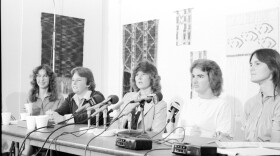President Obama is scheduled to deliver a foreign policy speech today aimed at bolstering public support for the Iran nuclear deal and making the case that the upcoming congressional vote on the measure is the "the most consequential foreign policy debate since the decision to go to War in Iraq," according to the White House.
You can watch it live here at 11:20 a.m. ET.
The president will speak at American University, located about 10 miles from the U.S. Capitol.
As NPR's Scott Horsley reported this morning for our Newscast, the location of the speech has some relevance.
"The setting for today's speech — at American University here in Washington — was deliberately chosen to invite comparisons to a commencement address that John F. Kennedy delivered there more than 50 years ago. That speech came less than a year after the Cuban missile crisis, and Kennedy appealed for a halt to the nuclear arms race with the Soviet Union. Negotiations that summer did lead to a partial test ban treaty with the Soviets, which was approved overwhelmingly by the U.S. Senate. Obama's deal with Iran is not likely to win anything like that kind of approval."
According to The Washington Post, Obama may have a harder time convincing Americans the deal is the best way to deal with Iran.
"Obama's task may be even more difficult than Kennedy's. On Tuesday, Israeli Prime Minister Benjamin Netanyahu did a webcast for more than 10,000 Jewish Americans in which he said that 'this is the time to oppose this dangerous deal.' "
Almost all congressional Republicans oppose the deal so winning over skeptical Democrats will be crucial if Obama hopes to ensure he has a veto-proof majority.
USA Today reports that Democrats may be the main audience for his message.
"The framing of that message appears to be a direct appeal to congressional Democrats, many of whom either opposed the Iraq War or came to regret their votes to authorize it. Obama will need their votes to get the one-thirds vote necessary to sustain a veto."
Because the Iran agreement is not a treaty, congressional approval is not needed. However the Republican-led Congress can vote on a resolution to approve or disapprove of the deal. A vote of disapproval could significantly hamper the president's ability to suspend U.S. sanctions against Iran.
Congress is expected to vote on the Iran resolution when it returns from a summer recess in September. If the disapproval resolution passes, the president has threatened to issue a veto.
Copyright 2015 NPR. To see more, visit http://www.npr.org/.






